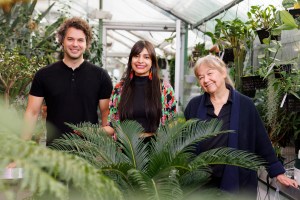Science & Tech
-

Rethinking — and reframing — superintelligence
Microsoft researcher says separating AI from people makes systems dangerous and unproductive
-
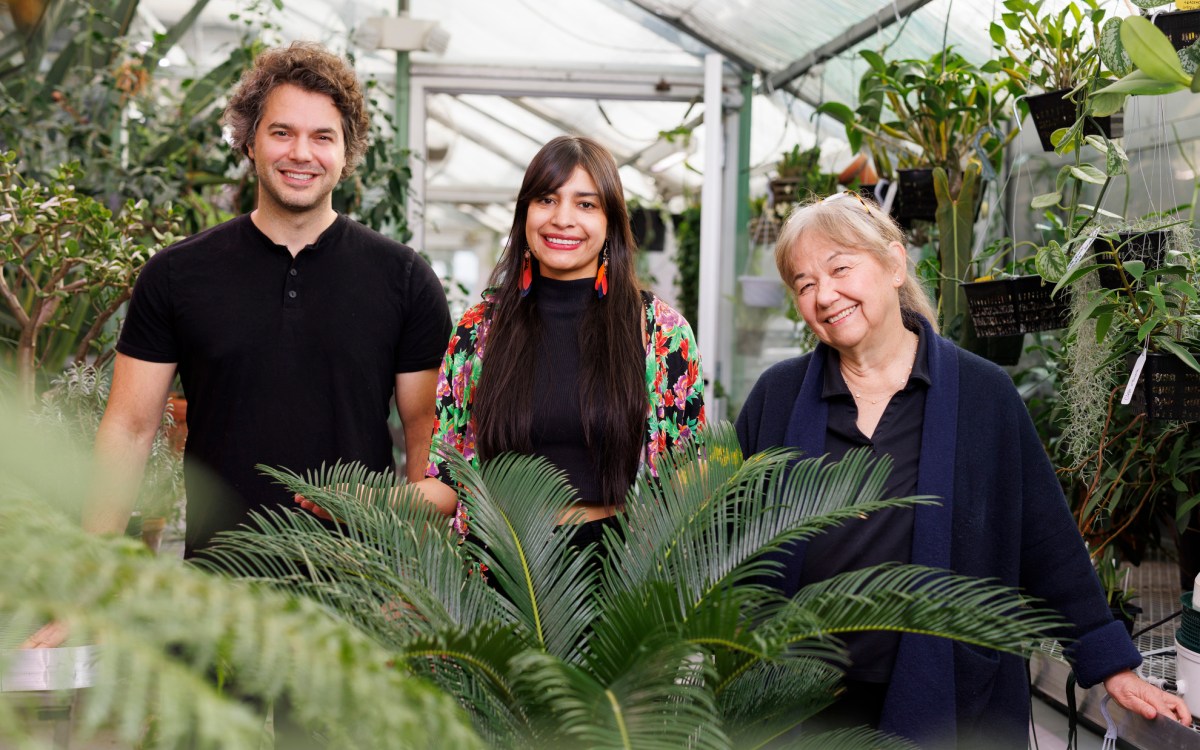
First, male gets heated up, then female, and then, you know
Study shows infrared radiation from plants serves as invitation to pollinating insects
-
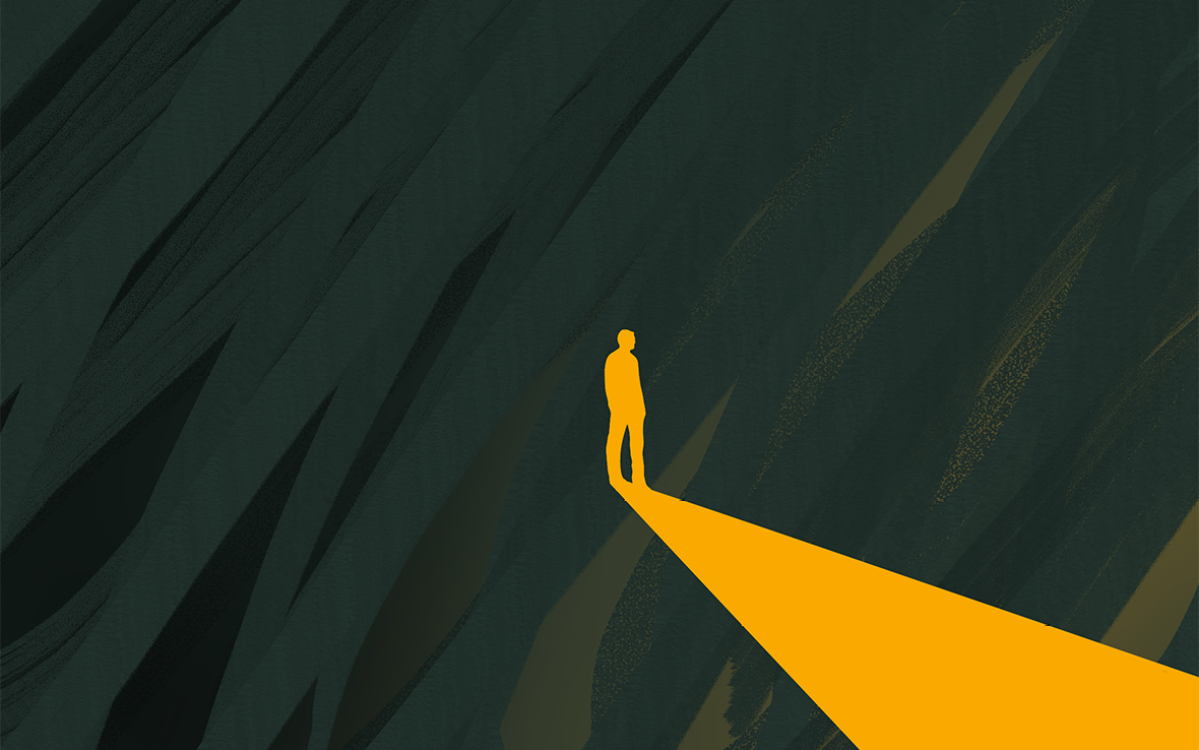
‘Consciousness’
What we know and don’t know about the life of your mind
-
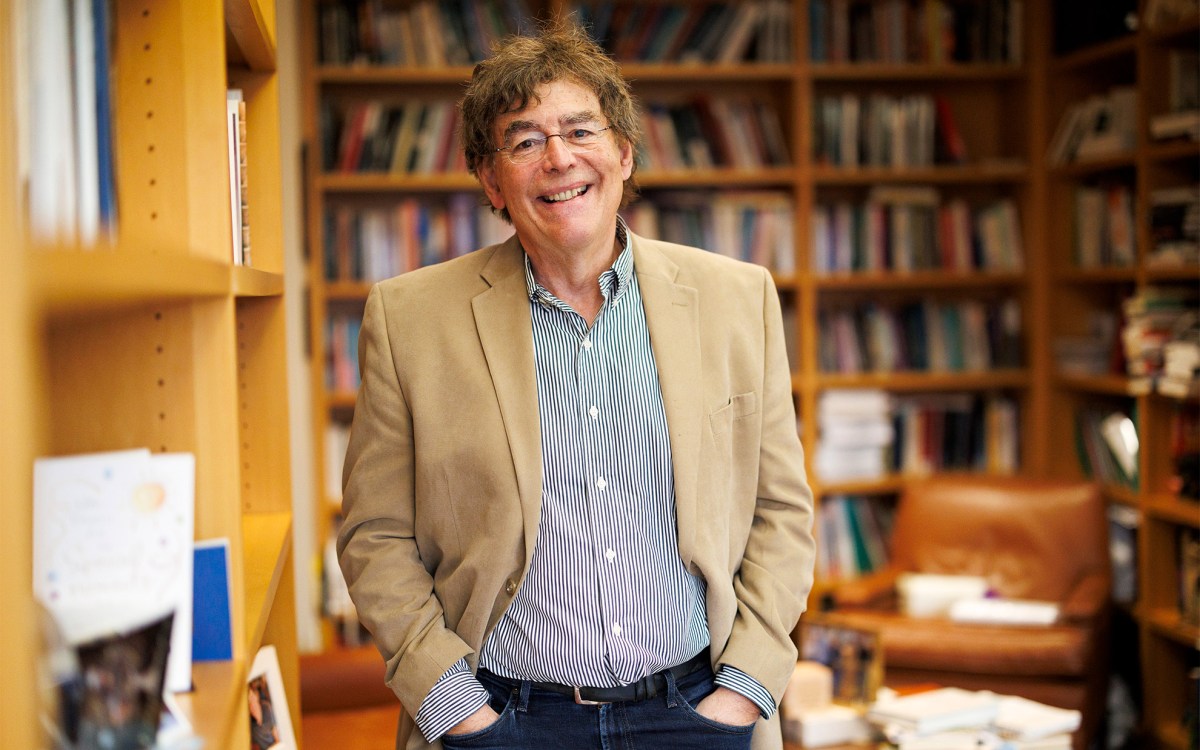
Science needs contrarians, and contrarians need support
Institute of Quantitative Social Science initiative tailored to researchers exploring provocative ideas
-

Cracking the code of why, when some choose to ‘self-handicap’
New research also offers hints for devising ways to stop students from creating obstacles to success

-
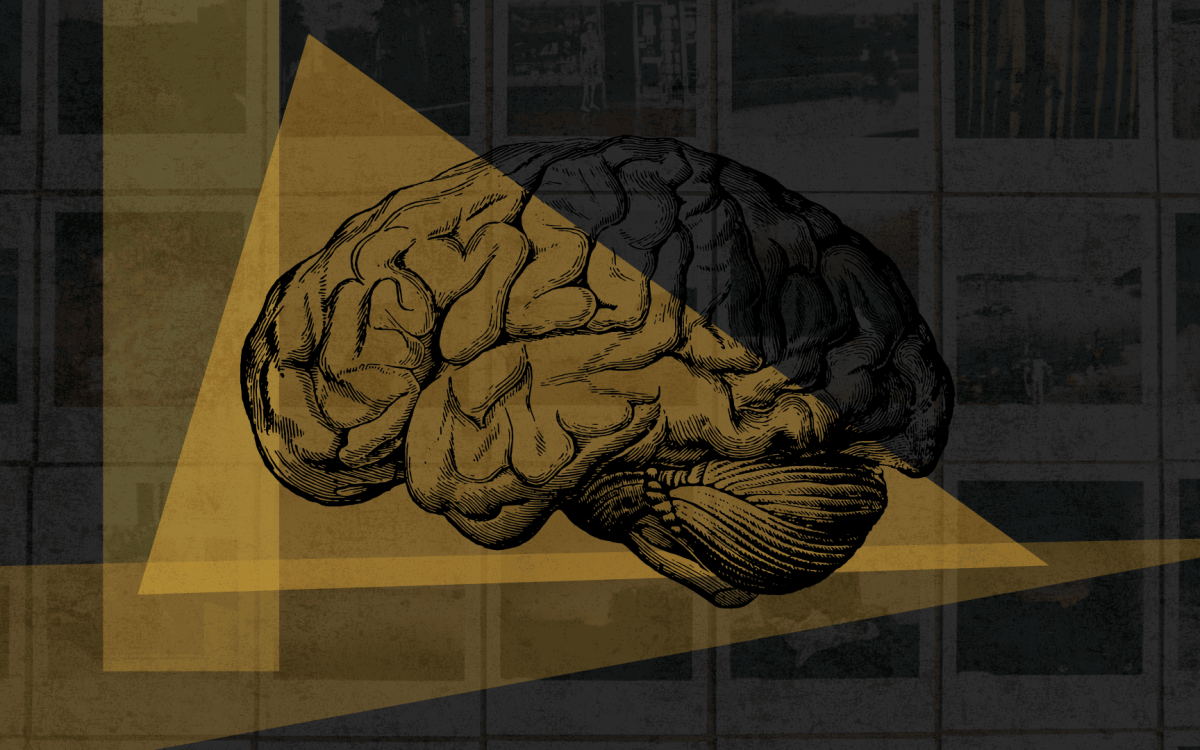
How memory works (and doesn’t)
In podcast, scientists explain why remembering is more reconstruction than replay
-
Scientists explore nature’s designs
As a graduate student, Harvard physical chemist Joanna Aizenberg acquired a passionate curiosity about — of all things — sponges. She particularly liked the ones made of glass, whose apparent fragility belied the fact that they could withstand terrific pressure in the deep sea.
-
Students looking to light African night
Some current and former Harvard students have joined forces in an effort to apply new technology to an old problem: how to light Africa’s rural areas far from modern power supplies.
-
Woolsey: New technologies will make need for oil obsolete
Salt was once highly valued as a preservative for meat, but eventually a new technology — refrigeration — greatly reduced its value. Today, rather than a contentious commodity, salt is a humdrum condiment.
-
U.S. energy answers there for the taking, says Amory Lovins
As U.S. automakers plead for a government bailout, the next great automotive revolution is already under way, as Japanese automakers plan for a generation of lightweight cars that vastly increase…
-
Strong evidence brown dwarfs form like stars
Astronomers have uncovered strong evidence that brown dwarfs form like stars. Using the Smithsonian’s Submillimeter Array (SMA), they detected molecules of carbon monoxide shooting outward from the object known as…
-
Looking at the universe, one particle at a time
Masahiro Morii is a tinkerer at heart, looking under the hood of the universe in hopes of finding unseen particles that explain how it all works.
-
Humanity may hold key for next Earth evolution
Human degradation of the environment has the potential to stall an ongoing process of planetary evolution, and even rewind the evolutionary clock to leave the planet habitable only by the bacteria that dominated billions of years of Earth’s history, Harvard geochemist Charles Langmuir said Thursday (Nov. 13).
-
Quantum computers could excel in modeling chemical reactions
Quantum computers would likely outperform conventional computers in simulating chemical reactions involving more than four atoms, according to scientists at Harvard University, the Massachusetts Institute of Technology (MIT), and Haverford College. Such improved ability to model and predict complex chemical reactions could revolutionize drug design and materials science, among other fields.
-
Moral dimensions of ‘the scientific life’
Scientific knowledge is reliable and it is authoritative. It is also often understood to be impersonal: The personal characteristics of a researcher are not thought to influence his or her findings. In recent work, historian Steven Shapin assumes the reliability and authority of scientific knowledge but illustrates how scientists’ personal characteristics and traits figure prominently in the making, maintenance, and perceived authority of scientific knowledge.
-
Student diggers take Harvard’s roots from dirt to display case
Emily Pierce ’10 was up to her hips in Harvard Yard, standing in a square hole in the ground, carefully scraping soil as she sought bits of archaeological treasure: a…
-
Global warming predicted to hasten carbon release from peat bogs
Billions of tons of carbon sequestered in the world’s peat bogs could be released into the atmosphere in the coming decades as a result of global warming, according to a new analysis of the interplay between peat bogs, water tables, and climate change.
-
Wildlife Conservation Society chief outlines scenarios
From the complex social structure of elephant herds to the understanding that gorillas are susceptible to deadly “human” diseases to the impacts of climate change, conservationists are struggling to balance a suite of challenges unknown in past generations.
-
David Clarke appointed as professor of materials in School of Engineering and Applied Sciences
David R. Clarke, an inventive materials scientist recognized worldwide for his out-standing contributions to the study of ceramic materials, has been named Gordon McKay Professor of Materials in Harvard University’s…
-
Evelyn Hu named professor of applied physics, electrical engineering in SEAS
Evelyn L. Hu, a pioneer in the fabrication of nanoscale electronic and photonic devices, has been named Gordon McKay Professor of Applied Physics and Electrical Engineering in Harvard University’s School…
-
10 ways to help
1. Drive less: Walk, bike, and take public transportation instead. Check out the Harvard Commuter Choice Program for information on ridesharing, discounts for MBTA passes, and more.
-
Lecture ‘Can’t you see I’m busy’ addresses ‘interruption management’
You’ve opened a Microsoft Word document and are just about to write. Feel good? No. Instead of inspiration, along comes Clippy, the annoying little pop-up man with his bobbing eyebrows and balloon full of intrusive questions. “It looks like you’re writing a letter. Would you like help?”
-
Solar system’s twin has two asteroid belts
Astronomers have discovered that the nearby star Epsilon Eridani has two rocky asteroid belts and an outer icy ring, making it a triple-ring system. The inner asteroid belt is a virtual twin of the belt in our solar system, while the outer asteroid belt holds 20 times more material. Moreover, the presence of these three rings of material implies that unseen planets confine and shape them.
-
Records dating back to Thoreau show some sharp shifts in plant flowering near Walden Pond
Drawing on records dating back to the journals of Henry David Thoreau, scientists at Harvard University have found that different plant families near Walden Pond in Concord, Mass., have borne…
-
Solar system’s young twin has two asteroid belts
Astronomers have discovered that the nearby star Epsilon Eridani has two rocky asteroid belts and an outer icy ring, making it a triple-ring system. The inner asteroid belt is a…
-
Gore: Universities have important role in sustainability
Former vice president Al Gore ’69 addressed a crowd of 15,000 in chilly, leaf-strewn Tercentenary Theatre Oct. 22, 2008, delivering the keynote address in a multi-day celebration of the University’s commitment to sustainability.
-
GSD lecture and panel address ‘Designing for Sustainability’
Interest in green building is high at the Harvard Graduate School of Design (GSD), judging by the attendance at a lecture Tuesday (Oct. 21) in the Stubbins Room at Gund Hall. “Designing for Sustainability” was part of the popular and event-packed sustainability celebration instituted this year by Harvard President Drew Faust.
-
Ban calls for international efforts
United Nations Secretary-General Ban Ki-moon called on the United States to combat the “imminent threat” of climate change, both by reducing its own greenhouse gas emissions and by leading the effort to craft a successor to the Kyoto Protocol.
-
Controlling greenhouse gases, universities, individuals matter
From 1850 to 2000, the use of fossil fuels worldwide grew 140-fold, a practice that has gradually filled the Earth’s atmosphere with warming gases.
-
Black holes are the heart of galaxies
Astronomers think that many — perhaps all — galaxies in the universe contain massive black holes at their centers. New observations with the Submillimeter Array now suggest that such colossal black holes were common even 12 billion years ago, when the universe was only 1.7 billion years old and galaxies were just beginning to form. The new conclusion comes from the discovery of two distant galaxies, both with black holes at their heart, which are involved in a spectacular collision.
-
Harvard’s green commitment
Harvard’s fall 2008 sustainability celebration included panels, tours, fairs, film screening, coffee-house style discussions – and the very convenient appearance of former Vice President Al Gore.
-
A protein found to restore blood glucose in type 1 diabetes model
A protein made by the liver in response to inflammation and used to treat patients suffering from a genetic form of emphysema has been shown to restore blood glucose levels…
-
HSCI creates Web presence for research
The Harvard Stem Cell Institute (HSCI) and the Harvard Initiative in Innovative Computing (IIC) have launched an online stem cell textbook that seeks to engage and inform the stem cell community as it presents up-to-date stem cell science in a format useful to scientists and students.
-
Star quest knowledge provides new view of ourselves
In a basement laboratory at the Harvard-Smithsonian Center for Astrophysics (CfA), surrounded by instruments built to detect the universe’s distant secrets, sits a machine that will help us look not outward to the stars, but inward at our own bodies.
-
Arctic ice is thinning steadily
There was a polar bear sighting at Harvard last week. At Pforzheimer House on Thursday (Oct. 2), global warming expert James J. McCarthy delivered a crisp summary of how fast ice is melting in the Arctic — and why we should care. The audience of 80 took in his companion slide show, including images of ice-stranded polar bears.
-
Exelon executive offers regulations, incentives to ‘green’ energy supply
The head of the nation’s largest nuclear power plant owner decried America’s lack of an energy policy Monday night (Oct. 6) and laid out a five-point plan featuring a mix of new regulations and financial incentives for coal, nuclear, and renewable power sources as a way to ‘green’ America’s energy supply.

